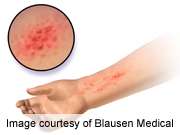For pediatric patients with refractory atopic dermatitis, oral azathioprine is associated with clinical improvement, and measurement of thiopurine methyltransferase activity seems useful for monitoring treatment, according to a study published online Aug. 13 in the Journal of the American Academy of Dermatology.
(HealthDay) -- For pediatric patients with refractory atopic dermatitis (AD), oral azathioprine is associated with clinical improvement, and measurement of thiopurine methyltransferase (TPMT) activity seems useful for monitoring treatment, according to a study published online Aug. 13 in the Journal of the American Academy of Dermatology.
To examine appropriate use and monitoring of azathioprine for children with AD, Maura Caufield, from the Georgetown University School of Medicine in Washington, D.C., and Wynnis L. Tom, M.D., from the University of California in San Diego, prospectively followed 12 children with severe, recalcitrant AD who were treated with oral azathioprine. At baseline, TPMT activity was measured, and, at times of stable improvement, inadequate response, or change in response, the measurement was repeated, together with measurement of 6-thioguanine nucleotide and 6-methylmercaptopurine.
The researchers found that, for all but one patient, azathioprine therapy correlated with clinical improvement, with few adverse effects. During treatment, three patients exhibited significant changes in TPMT activity: two had a mild decrease and one demonstrated enzyme inducibility, with enzyme activity increasing from intermediate to normal range. There was an inverse correlation between these changes and clinical response to therapy, which was not seen for 6-thioguanine nucleotide or 6-methylmercaptopurine levels.
"Our results suggest that TPMT activity can alter in either direction during treatment," the authors write. "Repeated measurement might be warranted, particularly in cases of nonresponse to treatment, to optimize dosing or to consider alternate therapy."
More information:
Abstract
Full Text (subscription or payment may be required)
Journal information: Journal of the American Academy of Dermatology
Copyright © 2012 HealthDay. All rights reserved.




















